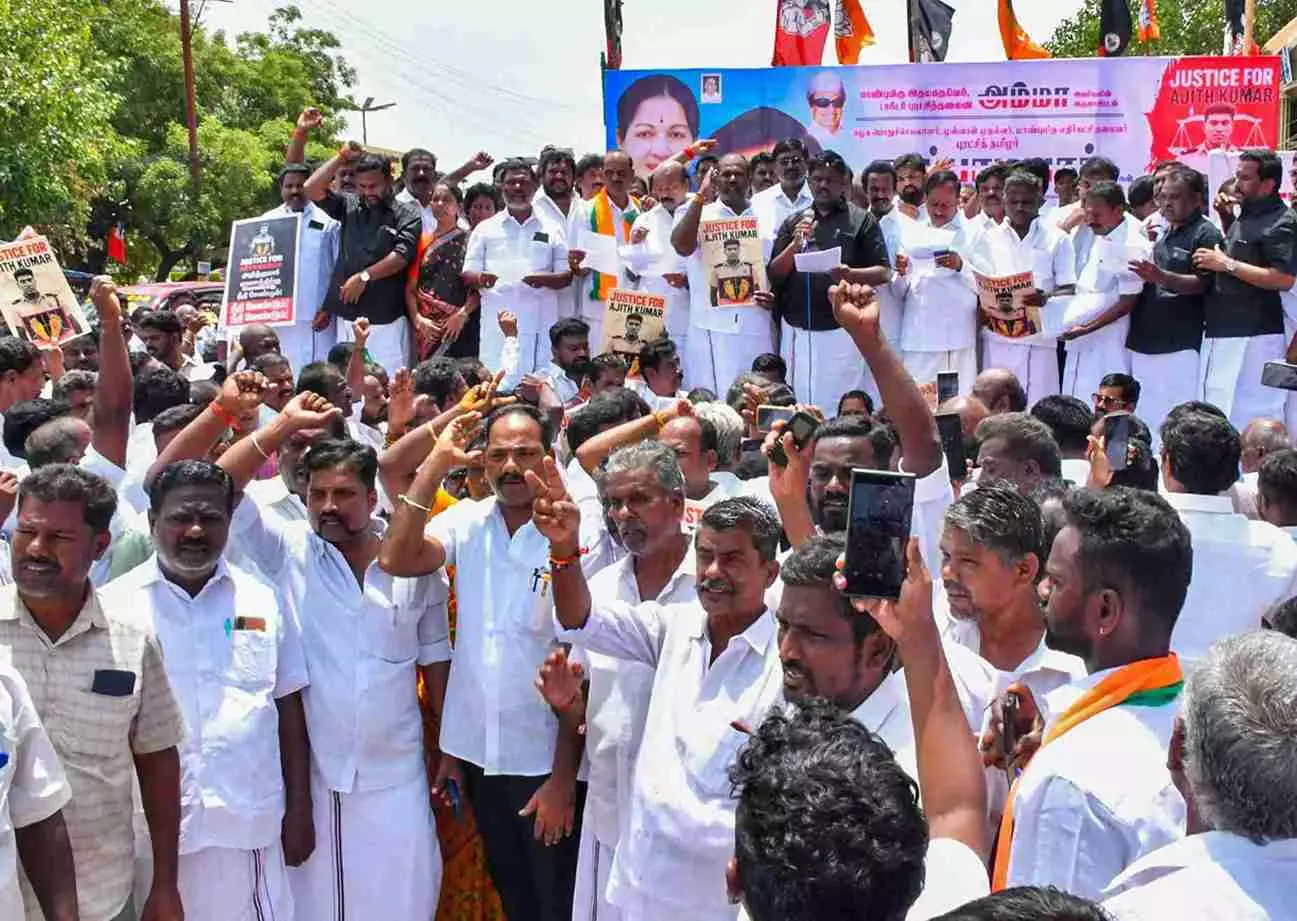
TN custodial death: Witness’s plea for safety brings VWDC delay in focus
SC’s 2018 directive required all district courts in India to establish Vulnerable Witness Deposition Centres within a year, equipped with certain facilities

The Sivaganga custodial death case has put renewed focus on the delay in establishing Vulnerable Witness Deposition Centres (VWDCs) in Tamil Nadu despite a 2018 Supreme Court mandate aimed at protecting vulnerable witnesses, including children and victims of sensitive cases.
Sakthishwaran, the 34-year-old eyewitness in Ajith Kumar’s custodial death case, has now filed a plea for protection, alleging threats to his life. It was a video recorded by him in secret that exposed the inhuman police brutality Ajith was subjected to.
Intimidation to witness
In a letter to Tamil Nadu’s Director General of Police (DGP), Sakthishwaran has detailed how he faced intimidation from a police officer named Raja, who has since been arrested in connection with Ajith’s death.
Also read: TN custodial death: Why theft complainant’s testimony is now under lens
The incident, which has sparked massive outrage, is under investigation by the 4th Additional District Judge in Madurai, as directed by the Madras High Court’s Madurai Bench.
Sakthishwaran has urged the DGP to provide him and his family with immediate police protection, citing ongoing threats to their lives. “My life is in danger,” he stated in a video, sending more shockwaves across the state.
Apex court directive
Sakthishwaran’s plea has reignited concerns over Tamil Nadu’s failure to fully implement VWDCs, which are critical to ensure that witnesses can testify without the fear of reprisal. The Supreme Court’s 2018 directive required all district courts in India to establish VWDCs within a year, equipped with facilities such as separate waiting rooms, live-link testimony, screens, microphones, and speakers to safeguard vulnerable witnesses.
Sakthiswaran told The Federal that some police officers have “directly threatened” him, while his family members have been subjected to threats as well. “I recorded a video of Ajith being attacked and submitted it to the court. They threatened me, saying, ‘Why did you do this? We won’t let you go easily.’”
What are VWDCs?
VWDCs are dedicated facilities designed to offer a safe and supportive environment for vulnerable witnesses to testify in legal proceedings. These centres aim to reduce the risk of secondary victimization and ensure the well-being of vulnerable individuals.
Also read: Sivaganga and more: Why do erring cops escape penalty for brutality?
VWDCs provide an accessible, separate space from the main courtroom, allowing witnesses to give their statements comfortably. By fostering a reassuring atmosphere, VWDCs enable vulnerable witnesses to communicate effectively, ensuring their testimony remains uncompromised.
Court rap
In 2024, the Supreme Court criticized Tamil Nadu for its delays, prompting the Madras High Court to issue further guidelines mandating compliance. However, according to information obtained through the Right to Information (RTI) Act, only Karur district in southern Tamil Nadu has a fully operational VWDC, complete with secure facilities for witnesses.
The remaining 12 districts under the Madurai Bench’s jurisdiction are lagging significantly. In Theni, Tiruchirappalli, and Madurai, VWDC construction remains incomplete. In Dindigul, the plan awaits high court’s approval, with no timeline for implementation. In Ramanathapuram, Thanjavur, Sivaganga, Tirunelveli, and Kanyakumari, proposals are pending with the Public Works Department (PWD). In Pudukkottai, plans to convert the Chief Judicial Magistrate Court into a VWDC have shown no progress, while in Kanyakumari, the PWD has deemed the construction of a VWDC unfeasible, further stalling efforts.
Violation of rights
This non-compliance has drawn sharp criticism from legal experts and activists, who argue that the absence of VWDCs leaves vulnerable witnesses exposed to intimidation, undermining the justice system.
Also read: TN custodial death: HC orders judicial probe, says ‘a state has killed its own citizen’
“The failure to establish these centres violates the fundamental rights of witnesses and erodes trust in the judiciary,” said a prominent Madurai-based lawyer. The issue is compounded by recent allegations of custodial torture in Sivaganga and Theni, highlighting systemic gaps in accountability within Tamil Nadu’s law enforcement and judicial frameworks. Legal advocates are now calling for urgent action.
Southern districts vulnerable
Human rights researcher Asirvatham said, “It is crucial to establish these centres in the southern districts because the majority of witness killings occur there. Many witnesses are killed after testifying in court while returning home. Caste conflicts and group clashes are also more prevalent in the southern districts. If this is the situation for men, you can imagine what might happen to women and children. Given this situation, adequate attention must be paid to the southern districts.”
The state’s inaction, they warn, may further compromise justice for those most in need of protection.

